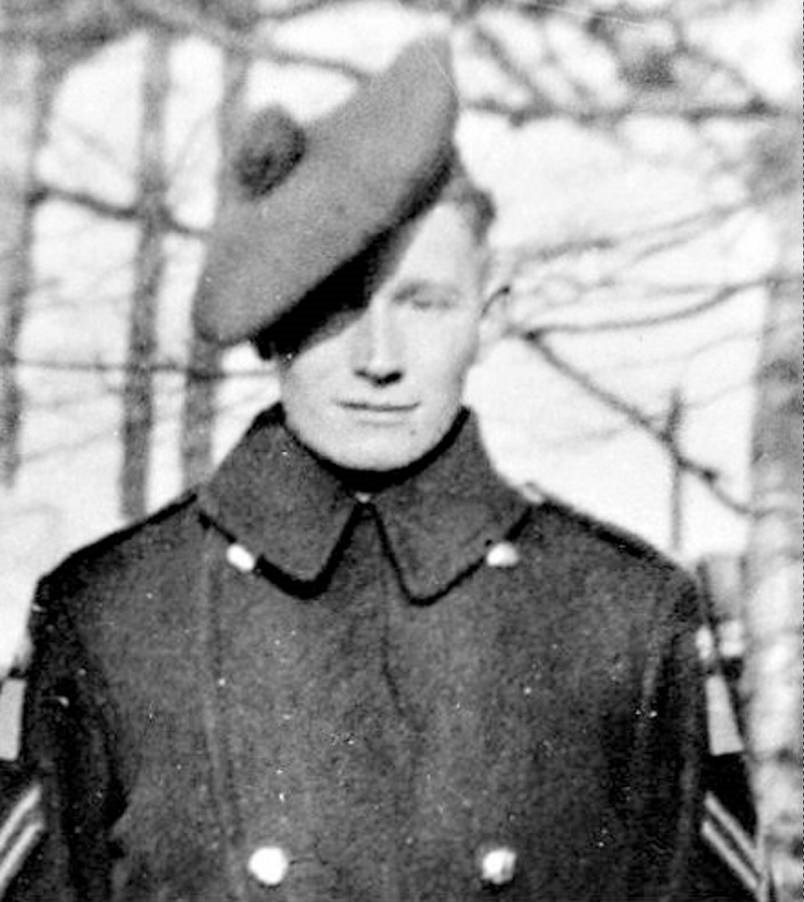Terry Byron cracked himself up remembering VE Day.
His wounds healed, he was in Aldershot, England, waiting to be sent back to the fighting when word of Germany’s surrender arrived in May 1945.
The sergeants’ mess went dry pretty quickly after that. “What they didn’t drink, they threw at each other,” he recalled.
Happily, Terry knew Big Nan, a strapping Scottish lass. “She said: ‘I pilfered this bottle of whisky from the officers’ supply, so you, me and these two girls are going to have a snort.” That bottle didn’t last long, either.
Terry told that story in 2013, when he was still living, alone, on his farm at the north end of Salt Spring Island. He was a live wire, slapping his knee, laughing.
“He was always laughing,” his son said Monday.
Terry’s brother Ken, by contrast, was a more serious sort. He also lived alone on a Salt Spring farm into his nineties, had also been part of the big mob of island boys who signed on with the Canadian Scottish when the Second World War broke out, had also been a sergeant wounded while leading a platoon. Tough as the callouses on their hands, the both of them.
And now they’re gone. Terry, who moved into extended care a couple of years ago, died Sept. 6 at 98. Ken was still on his farm when he died at 93 in 2014.
The old boys, the ones whose stories appeared in this space over the years, are disappearing quickly now. Saanich’s Mac Colquhoun, whose PoW camp exploits — he got rid of excavated escape-tunnel dirt by sifting it out his pant legs as he strolled around Stalag Luft III — became the stuff of Hollywood movies, died in May at age 103. That was the day after 96-year-old Rudi Hoenson, who had been a PoW when the Nagasaki atomic bomb detonated over his head. In April, it was yet another PoW, Sidney’s Ken Curry, who at 97 was the very last of the 582 men of his regiment who landed at Dieppe in 1942.
Last year, Veterans Affairs estimated that of the one million Canadians who served in the Second World War, just 33,200 were still around, 7,500 of them in B.C. Not much left but fading black-and-white photos now.
Terry’s son, also named Ken, said his dad, typical of that generation, didn’t talk about the war a lot. Ask him about the ugly stuff and he would deflect you with a funny anecdote like the one about Alberni’s Wing Hay, a Canadian Scottish soldier who, seeing some loose chickens, went looking for fresh eggs in a barn. Alas, what Hay discovered instead were a dozen or so German soldiers. “All these buggers stood up and put their hands up,” Terry said. The single-handed capture made headlines but didn’t fill any stomachs.
Terry was wounded in October 1944 while leading his platoon across Belgium’s Leopold Canal. “Most of us got across,” he recalled in 2013. “It was midnight, eh? When I thought it was appropriate, I stood up and a goddamned German grenade landed right in front of me.”
The blast ripped apart his left knee. Trapped between the Germans and the canal, he crawled until he found himself looking down a couple of gun barrels. “Who are you?” they asked. “Canadian Scottish,” Terry replied. They were Royal Winnipeg Rifles, who got him to a stretcher-boat. The last of the shrapnel was removed from Terry’s knee in 2007.
Ken was wounded twice by then, the first time on D-Day. Some of his shrapnel stayed in his head forever. What really haunted Ken in later years, though, was the memory of the road to Falaise that summer: heat, burning tanks, smashed carts, the stench of German corpses, everything bulldozed to the side to clear a path for the Canadians marching through foot-high dust. “Dead men, horses, livestock in nearby fields, all rotting. The smell is still with me,” he said in 2000.
When the war ended, the Byron boys were still in their early twenties.
Ken never married, never had kids. Terry made up for that by having 10 of them.
On Salt Spring, Terry raised horses, cattle and sheep, though his son says Terry wouldn’t eat the latter. Terry had had his fill during the war. “That greasy Australian mutton killed more Allied soldiers than the Germans did,” Terry would say.
Making light of the dark, that’s what Terry did. “It was a tough go, but you try to forget the tough stuff and remember the funny things, the good people you meet,” he said in 2013. No one wanted to remember the rest.



